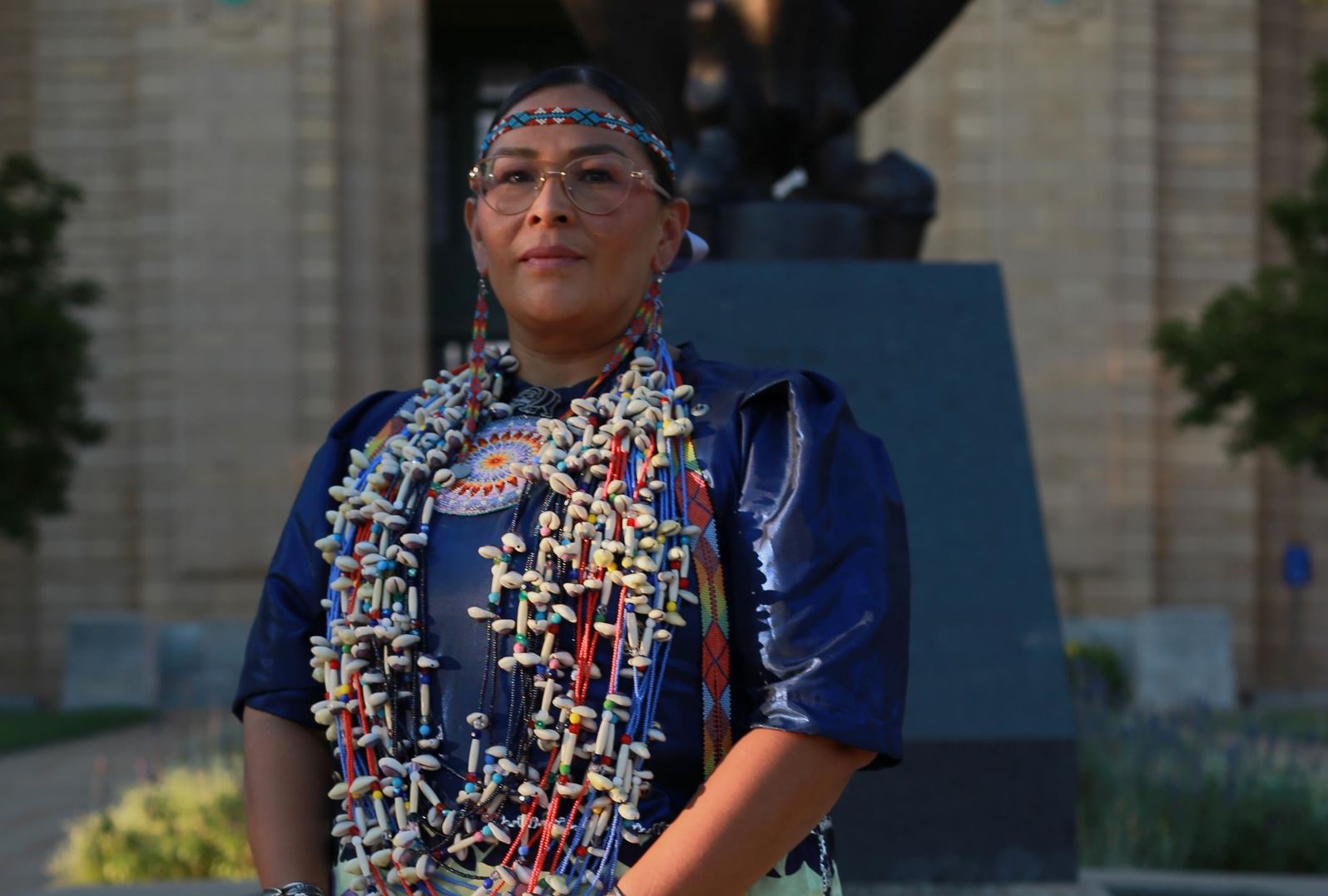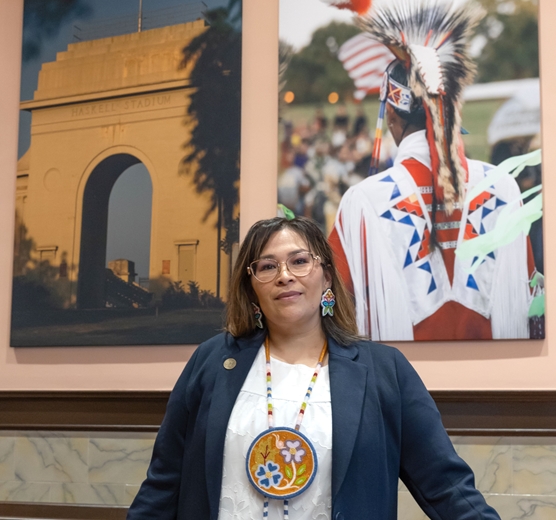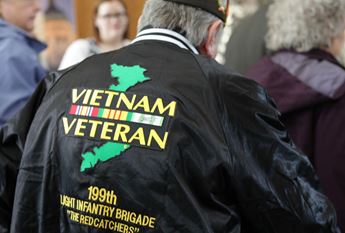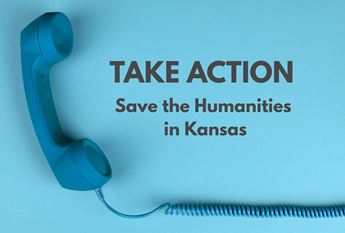

Meet Jancita Warrington
What’s your Kansas story?
I transferred to Haskell from another college that did not have the educational curricula I needed to prepare me for the path I knew I would take in life. So, I transferred to Haskell and participated in the Haskell-KU Exchange program. I continued my graduate studies at KU and paved my own way through graduate school. Being a single parent, I had to carefully balance parenthood and carefully weighed my options and opportunities. I ultimately found the best opportunities for the balance I was seeking here in Kansas. I have been here ever since. I return home to my reservation in Wisconsin often as I still have lifelong responsibilities there. That will always be my home, but Kansas is my second home and has a special place in my heart.
Describe what you do now. What inspires you about what you do?
I work in a public service position now for state government as the Executive Director of Native American Affairs. I love the work I do now and the opportunity to advocate for and foster a stronger government to government relationship with Kansas Tribes. My job provides an important platform to educate and engage my coworkers in meaningful discussions. I am inspired by the overall need to better understand Tribal history as it pertains to law and policy. This is something not many states provide as part of public education. Once Tribal history is better understood, the rights of Tribes to exercise their rights as a sovereign nation may be better understood. This understanding can create stronger government to government relationships that can be beneficial in ways we haven’t realized yet.
When you hear the word “humanities,” what comes to mind?
Humanities to me is a unique learning experience about a culture of peoples. This often involves people telling stories from their personal experiences, family and community legacies that shape who they are. I find meaningful inspiration in stories embedded in forms of art, music, literature, storytelling and performance arts. I am inspired by the stories of local people, both past and present. I am and have always been intrigued by history and the personal stories that allow me to experience that history a little deeper. I feel humbled to hear stories especially first-hand accounts of people and communities because they bring history to life. I recognize and am passionate about preserving the stories that shape who we are as communities.
To hear amazing stories of trials and tribulations, and to learn how the perseverance and determination of peoples during certain time periods is a gift. These experiences help foster a deeper appreciation, respect and understanding of that history and how it contributes to my understanding of the world today. I love the humanities because it creates unique experiences for peoples of all ages, classes and races to see, experience and feel the arts and cultures in a new way. This kind of firsthand experience promotes understanding and fosters a new appreciation for things outside of our own culture, creating platforms for discussions that hopefully will create a brighter future for all our children.
Kansas is rich in stories.
Share a memory or experience when the humanities—whether art, literature, music, or a film—deeply resonated with you or left a lasting impression?
I was able to meet the daughter of one of the first graduates in the Haskell Commercial program (1908), which is now known as Business, and he was also a highly decorated WWI solider. I traveled to her home in another state for a weekend visit where she shared local newspapers articles, letters and diaries written by her father during World War I. She shared many stories he would reference about his time spent at Haskell Institute and how these experiences shaped his life. This was the most amazing experience that left a lasting impression I think about often. It strengthened my appreciation for humanities and continues to inspire me to participate in preservation projects.
While working at the Haskell Cultural Center and Museum I engaged with many visitors and feel blessed to have heard their personal stories. A vivid and memorable story came from a elder alumni visitor. She chose to travel seven hours one way with her daughter and two best friends (who were her former roommates while they all attended Haskell) to spend her 90th birthday revisiting Haskell for the first time since she graduated. She and her friends were 11-12 years old when they met, were roommates at Haskell and remained lifelong friends, staying in contact as pen pals with one another for the last 75 years. Her family surprised her and flew her friends to spend her birthday together, for perhaps the final time, being particularly memorable because they had not seen one another in 60 years. They all being former students shared personal experiences of their initial trip to attend Haskell, their time at Haskell and how this experience shaped their lives. To hear those stories and see those memories from that time come to life with light in their eyes was a memory I will never forget. To be taken back to a time long before I was born and learn about what life was like at Haskell through the eyes of these women is nothing you can experience from reading a book or hearing a story as a secondhand account. These are experiences I cherish and is what inspires me to continue to work to preserve stories because I have experienced the powerful impact humanities experiences can provide to people of all ages.
Why do stories matter in Kansas today?
Stories matter. There are stories that surround us daily from nature to buildings and places in our communities. Every story has meaning and collectively enriches our community and state. The history here in Kansas is so beautifully unique. Although the history was not always beautiful, the people persevered, and the state motto ad aspera per aspera is truly fitting and a perfect description of these experiences. Seeds were planted and they are starting to emerge in a beautiful and powerful way.
What about your community inspires you? What about Kansas inspires you?
My community inspires me in many ways. The diversity, culture and stories of the land inspires me most. The land is filled with stories of sacrifice, courage, a strong will and ability to persevere. A legacy lives in the land, the trees, the water and within the peoples of all these communities. I am inspired by the diversity in history, cultures and ideas that make up Kansas. Kansas would not be as inspiring to me if it were not for Humanities Kansas which brings programs and scholars to my town. Living in Lawrence and experiencing many cultures and ideas continues to stimulate and challenge me to listen and think about things from many viewpoints.
Kansas is rich in stories. The most profound and unknown story is that of the 1926 dedication on the Haskell Stadium and WWI Memorial Archway. It was a story that needed to be shared so to help educate the community, the state and the rest of the country about this important history and the impact it almost 100 years ago, the Douglas County Heritage Conservation Council, the City of Lawrence, Second Wind Creative, and other partners helped to support the creation of a project called Keeping Legends Alive. Research was conducted which helped preserve stories, pictures, restored documents related to the event. Second Wind Creative helped create a short film called Keeping Legends Alive that can be viewed on YouTube. The impact of this event was profound and created opportunities for some of the first Humanities interactions between Native American Tribes and the rest of the country. These interactions helped introduce a change in the public perception of Tribal peoples only portrayed in government reports. After experiencing Tribal peoples firsthand many Kansans and other attendees relayed Tribal peoples were not in fact as described but compassionate, loving, creative artists with a rich and beautiful culture. This Kansas event brought prominent national attention to this important issue. Two years later in 1928, a national report called the Meriam Report was issued, that led to national policy changes with the passage of the Indian Re-Organization Act of 1932. Humanities experiences can and do resonate far outside of communities and can ignite change that impacts the world.
What do you wish people knew or understood about Kansas?
I wish first and foremost people knew more about the entire history of this state. Not just starting at statehood, but Kansas has a long and unique Tribal history pre-statehood. This state was created in opposition of slavery, supporting the idea of freedom and equity. Statehood was the infancy stage of the state’s evolution. From statehood until now we have many more chapters to our state story. I wish this rich history was taught thoroughly as part of the public education system, both k-12 and in post-secondary education across the state. I believe it is an underdeveloped idea that would create a foundation that could raise the standard for public education. I firmly believe the more we recognize and understand our collective history, the better we prepare our future leaders, so they are ready to contribute the vision for the future of Kansas
What does the future of Kansas look like to you?
I would like to see Kansas evolve as a leader in education partnered with the humanities to create a new kind of educational experience. The future is bright, and Kansas has some great opportunities approaching for all to engage with. From the new Kansas exhibit at the Kansas Historical Society highlighting the amazing history and stories that weave the fabric of Kansas, to the Americans traveling exhibit Humanities Kansas is bringing to seven sites across the state, to events that will occur throughout 1926 across the state as part of the Americas 250th- Kansas, the opportunities to enrich our communities will be plentiful. I am hopeful leadership across the state will engage and be inspired to better support the preservation of arts and culture. I would like to see Kansas unify to support the agriculture that continues to contribute profoundly to the state. Finally, I hope all Kansans will unify, support and help find a solution to the threat of water shortage here in the state.

What is a cultural attraction in Kansas that everyone should experience that is uniquely Kansas?
A powwow. There are many to choose from across the state. A few recommendations would be the Indigenous Dance and Cultures Festival Powwow in April annually held at the Lied Center at KU. Haskell Indian Nations University has a graduation powwow in May annually. The Prairie Band Potawatomi Tribe located in Mayetta has their annual powwow the second weekend in June. All these events are open to the public and provide opportunities to experience cultural songs, dances, food and artists in all media.
What is a Kansas culinary dish or restaurant everyone should try?
A Kansas culinary dish you must experience is traditional Indian corn soup. This is something I would encourage every Kansan to try at least once. You can find this available at many powwows. This is not a dish you can find at any restaurant in Kansas. You must visit a Tribal event to find it. The Prairie Band Potawatomi Tribe hosts an annual powwow around the second weekend in June and it is likely you will find this in the traditional food court. It is grown in traditional Potawatomi gardens and comes from strands of corn that are thousands of years old and are non-GMO. This food source has provided sustenance to Indigenous peoples for thousands of years.
What are a few of your favorite movies or reads and why?
Documentaries are my favorite kind of movie. I like learning about new things and gaining a different perspective on things that are real and affect real people’s lives and communities. Indians that Rocked the World is one of my favorites. Although the TV show Yellowstone is not a movie, it had several seasons, and I feel was well written. I liked that it also created the preludes 1887 and 1923 that explain a bit more about how the themes in Yellowstone evolved. In a fast paced and ever-changing world, the show highlighted the beauty of bountiful pockets of nature that still exist in the United States. I hope it inspired viewers to visit these places and appreciate the balance that nature provides the human soul.
As for my favorite reads, I read lots of Federal Policy and Indian Law books authored by Tribal leaders in these areas. That is because the law is constantly changing, evolving, and is complicated when it comes to Federal Indian Law. It is important to stay engaged to be able to help contribute as part of a collective movement dedicated to preserving and exercising Tribal sovereignty in all areas of the law.



